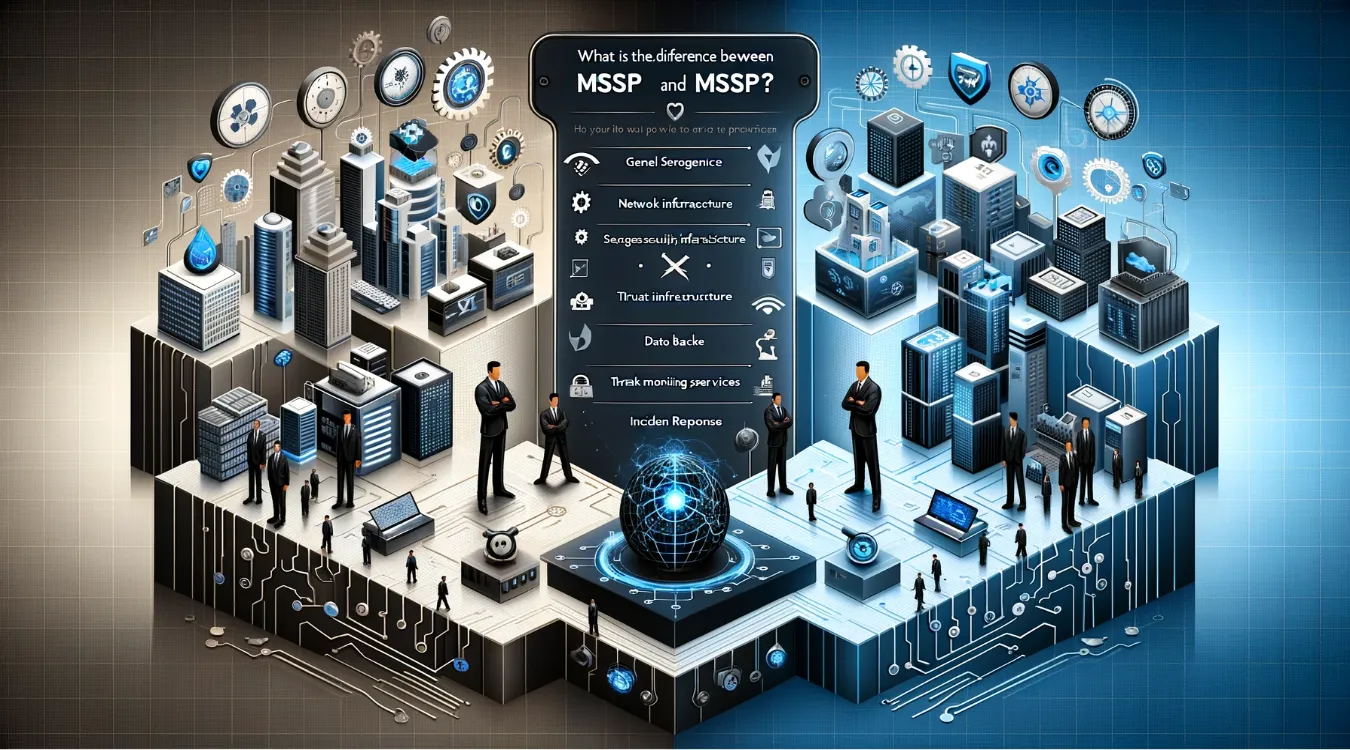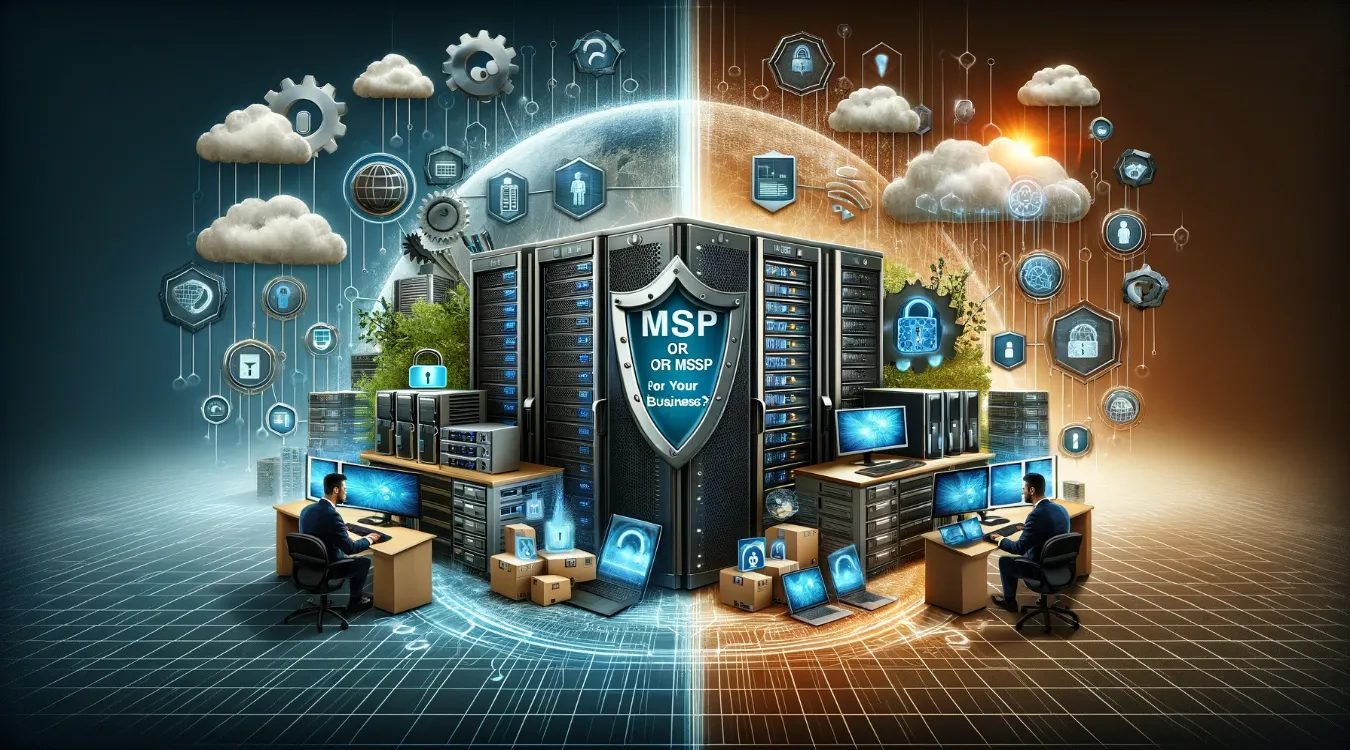Cyberus Systems: Bridging the Gap in Cybersecurity Knowledge
In the rapidly evolving world of cybersecurity, understanding the roles and capabilities of different types of service providers is crucial for businesses, especially small ones, to ensure robust protection against cyber threats. Cyberus Systems, with its expertise in providing top-notch cybersecurity solutions, offers this primer to demystify two key players in the cyber defense realm: Managed Service Providers (MSPs) and Managed Security Service Providers (MSSPs).
What are MSPs and MSSPs?
- Managed Service Providers (MSPs) primarily focus on the overall IT needs of a business. They manage and maintain a company’s IT infrastructure, ensuring smooth day-to-day operations. MSPs handle a wide array of IT services, from network management and software updates to data backup and recovery. Their role is to keep your IT environment running efficiently, reducing downtime and improving operational productivity.
- Managed Security Service Providers (MSSPs), on the other hand, specialize in managing a company’s cybersecurity posture. MSSPs offer a more focused and in-depth approach to protecting against cyber threats. They provide services like real-time monitoring, threat intelligence, incident response, and compliance management. By partnering with an MSSP, businesses gain access to specialized security expertise and advanced technologies designed to preemptively identify and mitigate cyber risks.
Why is it Crucial to Understand the Difference?
For small businesses, cybersecurity is not just a technical necessity but a strategic imperative. Recognizing the distinct roles of MSPs and MSSPs helps businesses make informed decisions about their cybersecurity strategies. While MSPs ensure the overall functionality and efficiency of IT systems, MSSPs bring a focused lens on protecting those systems from ever-evolving cyber threats.
Understanding this difference is the first step in determining which services align best with your business needs. Whether it’s enhancing existing IT infrastructure with an MSP or fortifying your cyber defenses with an MSSP, making the right choice can significantly impact your company’s security posture and resilience against cyber threats.
As a leader in cybersecurity solutions, Cyberus Systems is dedicated to empowering small businesses with the knowledge and tools they need to navigate the complex cyber landscape. This introduction sets the stage for a deeper exploration into how MSPs and MSSPs operate, their unique benefits, and how to choose the right provider for your specific needs.
Stay tuned as we delve further into the world of MSPs and MSSPs, and discover how Cyberus Systems can help safeguard your business in the digital age.
Exploring the Role of MSPs in Cyber Security
Cyberus Systems: Unraveling the Functions of MSPs
In the landscape of IT and cybersecurity, Managed Service Providers (MSPs) play a pivotal role. At Cyberus Systems, we recognize the importance of understanding what MSPs do and how they contribute to the overall cybersecurity framework, particularly for small businesses. This section explores the definition, key functions, services offered, and typical use cases of MSPs.

What are MSPs and Their Primary Functions?
- Definition: Managed Service Providers (MSPs) are companies that manage, maintain, and support a business’s IT infrastructure remotely. They act as an outsourced IT department, handling various IT tasks that range from routine system maintenance to more complex IT strategy implementation.
- Primary Functions: The core function of an MSP is to ensure the smooth operation of a business’s IT environment. This includes proactive monitoring and maintenance, which helps in preventing IT problems before they disrupt business operations. MSPs also provide support and troubleshooting, ensuring any IT issues are resolved swiftly.
Key Services Offered by MSPs
MSPs offer a wide array of services that cater to different aspects of IT management. Some of these include:
- Network Management: Overseeing the company’s network infrastructure to ensure consistent connectivity and performance.
- Data Backup and Recovery: Implementing solutions to safeguard data, ensuring business continuity in case of data loss incidents.
- Software Management: Managing software installations, updates, and patches to keep systems up-to-date and secure.
- Cloud Services: Facilitating the transition to and management of cloud computing resources.
- Cybersecurity Measures: While not as specialized as MSSPs, many MSPs offer basic cybersecurity services like firewalls, anti-virus software, and basic security assessments.
Typical Clientele and Use Cases
MSPs commonly cater to small and medium-sized businesses. These businesses often lack the resources or need to maintain a full in-house IT department. MSPs step in to fill this gap by providing comprehensive IT support. Common use cases include:
- Small Businesses Seeking Comprehensive IT Support: Companies looking to outsource their entire IT operations to focus on their core business functions.
- Organizations Needing Scalable IT Solutions: Businesses experiencing growth and requiring scalable IT solutions that can adapt to their changing needs.
- Companies Looking for Cost-Effective IT Management: Organizations seeking to minimize the costs associated with maintaining an in-house IT team.
By partnering with an MSP, businesses can enjoy a range of IT services that contribute to their operational efficiency and stability, allowing them to focus more on their primary business objectives. For small businesses, this partnership is often crucial in leveling the playing field, giving them access to professional IT services that were traditionally available only to larger corporations.
Understanding MSSPs: A Specialized MSP for Enhanced Cyber Security
Cyberus Systems: Spotlight on the Specialists in Cyber Security
While Managed Service Providers (MSPs) cover a broad spectrum of IT services, Managed Security Service Providers (MSSPs) take a more focused dive into the realm of cybersecurity. This specialization is critical in today’s digital landscape, where cyber threats are not only becoming more sophisticated but also more frequent. Cyberus Systems sheds light on the definition, core functions, and distinctive services of MSSPs, explaining how they cater to specific security needs, especially for small businesses.

What are MSSPs and Their Core Functions?
- Definition: Managed Security Service Providers (MSSPs) are specialized service providers that focus exclusively on cybersecurity. Their objective is to protect businesses from cyber threats and ensure compliance with various cybersecurity standards and regulations.
- Core Functions: The primary role of an MSSP is to provide a comprehensive and proactive security posture for businesses. This involves continuous monitoring and management of security systems, identifying potential vulnerabilities, and responding to security incidents. MSSPs are the guardians of a business’s cyber health, working tirelessly to prevent, detect, and respond to threats.
Distinctive Services Provided by MSSPs
MSSPs offer a range of specialized services that set them apart from traditional MSPs:
- Real-Time Monitoring and Incident Response: Implementing systems that continuously monitor for suspicious activities and provide rapid response to potential threats.
- Threat Intelligence and Risk Assessment: Utilizing advanced tools and knowledge to anticipate and prepare for emerging cyber threats, and conducting regular risk assessments.
- Compliance Management: Ensuring that businesses meet regulatory and industry-specific cybersecurity standards, an essential aspect for many small businesses in regulated sectors.
- Advanced Security Technologies: Employing cutting-edge security technologies like intrusion detection systems, advanced firewalls, and endpoint protection solutions.
- Employee Training and Awareness Programs: Offering training to staff to recognize and mitigate cyber threats, a key element in strengthening a business’s overall security posture.
How MSSPs Cater to Specific Security Needs?
MSSPs are particularly beneficial for businesses that:
- Require Advanced and Dedicated Cybersecurity Expertise: Especially for small businesses that may not have in-house cybersecurity specialists.
- Operate in High-Risk or Regulated Industries: Where cybersecurity compliance is not just beneficial but mandatory.
- Need to Supplement Existing IT Capabilities: For businesses that have an MSP but require additional, specialized security support.
MSSPs act as a strategic partner, offering a level of expertise and attention that is essential in a landscape where cyber threats are complex and ever-changing. They allow businesses, particularly small ones without extensive in-house resources, to have access to top-tier cybersecurity defenses, leveling the playing field against larger competitors.
What is the Difference Between MSP and MSSP?: A Detailed Analysis
Cyberus Systems: Deciphering the Differences and Similarities
In the world of IT and cybersecurity services, understanding the nuances between Managed Service Providers (MSPs) and Managed Security Service Providers (MSSPs) is crucial for businesses, particularly small ones, to make informed decisions. Cyberus Systems offers a detailed analysis of both, highlighting their similarities and critical differences in terms of service scope, expertise, and focus areas.

Similarities between MSPs and MSSPs
Despite their differences, MSPs and MSSPs share some common ground:
- Outsourced IT Functions: Both act as external service providers that manage and maintain IT functions, allowing businesses to focus on their core operations.
- Support and Maintenance Services: They provide ongoing support and maintenance services, ensuring the smooth operation of business IT systems.
- Focus on Preventing Downtime: Both aim to prevent system downtime, whether it’s through general IT maintenance (MSPs) or specific cybersecurity measures (MSSPs).
- Scalability and Flexibility: MSPs and MSSPs offer services that can scale and adapt according to a business’s growth and changing needs.
Critical Differences: Service Scope, Expertise, and Focus Areas
While MSPs and MSSPs share similarities, their differences are significant:
- Service Scope:
- MSPs: Offer a broad range of IT services, covering general IT management, network infrastructure, data backup and recovery, and basic cybersecurity measures.
- MSSPs: Specialize in cybersecurity, providing advanced security services like real-time threat monitoring, intrusion detection, compliance management, and incident response.
- Expertise:
- MSPs: Have a broad understanding of IT infrastructure and general IT needs.
- MSSPs: Possess specialized knowledge in cybersecurity, staying abreast of the latest threats and security technologies.
- Focus Areas:
- MSPs: Focus on overall IT efficiency and stability, ensuring that IT systems support business operations effectively.
- MSSPs: Concentrate on protecting businesses from cyber threats, ensuring data integrity, and maintaining compliance with cybersecurity regulations.
For a small business, choosing between an MSP and an MSSP often depends on specific needs. If the primary concern is managing and maintaining IT infrastructure efficiently, an MSP might be the right choice. However, if the focus is on fortifying against cyber threats and ensuring compliance with security standards, partnering with an MSSP becomes essential.
Cyberus Systems understands the importance of this decision and is committed to providing tailored advice and solutions. Whether you need comprehensive IT support or specialized cybersecurity services, we are here to help guide you through these choices, ensuring your business remains secure and efficient in the digital landscape.
Choosing the Right Provider: MSP or MSSP for Your Business?
Cyberus Systems: Guiding You to Make the Best Choice
The decision between partnering with a Managed Service Provider (MSP) or a Managed Security Service Provider (MSSP) is pivotal for small businesses. It shapes not only how your IT infrastructure is managed but also how well your business is protected against cyber threats. Cyberus Systems, with its expertise in cybersecurity, offers guidance on the factors to consider when making this choice and how to tailor it to your organization’s specific needs.

Factors to Consider When Selecting an MSP or MSSP
Making an informed decision involves evaluating several key factors:
- Current IT Infrastructure and Expertise: Assess the state of your current IT infrastructure. If you have a robust setup but lack security expertise, an MSSP might be more appropriate. Conversely, if you need comprehensive IT support, an MSP is likely the better choice.
- Cybersecurity Needs and Threat Landscape: Consider the level of cybersecurity required for your business. If you handle sensitive data or operate in a high-risk industry, an MSSP’s specialized security services are crucial.
- Compliance and Regulatory Requirements: If your business is subject to industry-specific regulations, such as HIPAA for healthcare or GDPR for data protection, an MSSP’s expertise in compliance can be invaluable.
- Budget and Resource Allocation: Evaluate your budget for IT and cybersecurity services. MSPs can offer a more generalized range of services which might be more cost-effective, while MSSPs provide specialized, often more intensive, security services.
- Long-term Business Goals and Growth Plans: Align your choice with your business’s future. If scaling up is a goal, consider how each provider can support your growth and adapt to changing needs.
- Level of Required Support and Availability: Determine the level of support you need. If round-the-clock monitoring and rapid incident response are priorities, then an MSSP’s specialized services are essential.
Tailoring the Choice to Your Organization’s Needs
Your business is unique, and so are its requirements:
- For Businesses Prioritizing General IT Management: If your main concern is maintaining and optimizing IT operations, an MSP offers a comprehensive solution.
- For Businesses with a Strong Focus on Cybersecurity: If protecting against cyber threats is a top priority, especially if you’re handling sensitive data or operating in a vulnerable industry, choose an MSSP.
- For Those Needing a Combination of Both: Some businesses might benefit from a hybrid approach, utilizing an MSP for general IT services and an MSSP for specific cybersecurity needs.
Cyberus Systems recommends a thorough evaluation of your business’s specific requirements, risks, and goals to determine the most suitable partnership. Whether it’s an MSP or an MSSP, the right choice should align with your business strategy, offering the support and protection you need to thrive in today’s digital world.
FAQs
What is the main difference between an MSP and an MSSP?
The main difference lies in their focus areas. MSPs provide a broad range of IT services, focusing on the overall management and efficiency of your IT systems. MSSPs, however, specialize in cybersecurity, offering advanced security measures and expertise to protect your business from cyber threats.
Can a small business just use an MSP instead of an MSSP?
Yes, a small business can use an MSP for general IT needs. However, if cybersecurity is a major concern, especially in industries handling sensitive data, partnering with an MSSP or choosing an MSP that also offers specialized cybersecurity services would be advisable.
Are MSP and MSSP services only for large corporations?
Not at all. While large corporations benefit from these services, small and medium-sized businesses are often the primary clients for MSPs and MSSPs. These providers help level the playing field by offering small businesses access to professional IT and cybersecurity services.
Is it cost-effective to integrate both MSP and MSSP services?
Integrating MSP and MSSP services can be cost-effective, as it provides a comprehensive approach to IT management and cybersecurity. This integration can lead to better resource allocation and streamlined operations, potentially reducing overall costs.
Can an MSP or MSSP guarantee complete protection from cyber threats?
While MSPs and MSSPs significantly enhance your cybersecurity posture, no service can guarantee complete immunity from cyber threats. The digital landscape is constantly evolving, and so are the nature of threats. Regular updates and proactive defense strategies are key to maintaining robust security.
Conclusion: Enhancing Security with MSP and MSSP Integration
Cyberus Systems: Simplifying Cybersecurity Choices
In this guide, we’ve explored the distinct yet complementary roles of Managed Service Providers (MSPs) and Managed Security Service Providers (MSSPs). For small businesses, understanding the difference and how to leverage these services is key to robust cybersecurity.
Key Takeaways
- MSPs focus on overall IT management, while MSSPs specialize in advanced cybersecurity.
- Choosing between MSP and MSSP depends on your business’s specific IT and security needs.
- Integrating MSP and MSSP services offers comprehensive IT and security management, ensuring both efficiency and protection.
The Strategic Integration Advantage
Integrating MSP and MSSP services can offer small businesses the best of both worlds: efficient IT management coupled with advanced cybersecurity measures. This approach provides a unified strategy, aligning IT operations with security needs for more effective protection.
Cyberus Systems understands the importance of this integrated approach and is dedicated to helping businesses achieve a balanced, secure, and efficient IT environment. Remember, adapting to the evolving digital landscape is vital for your business’s growth and security.
